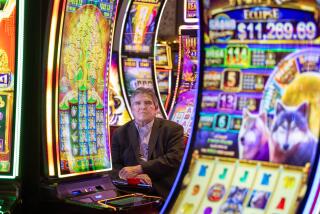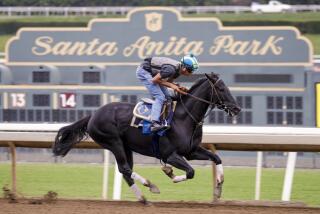This Indian casino isn’t a gamble
There is just one part of the Aug. 19 editorial “A bad bet on Indian casinos” that we agree on: “There should be some flexibility for tribes ... left in poverty because their reservations happen to be in particularly hard-to-reach locations .... That could include allowing a small number of off-reservation casinos that are not close to urbanized areas.”
That’s exactly what Congress intended when it permitted -- in rare circumstances, after rigorous review and as a matter of social justice -- tribes with no or unusable land to petition to take land into trust for tribal gaming.
And it’s exactly why our proposed North Fork Rancheria casino project deserves support.
Our tribe is located in a poor, rural county with high rates of unemployment and poverty. We have a large number of needy tribal citizens but only a remote, inaccessible piece of land that is owned by individual tribal citizens (not the tribe) and is wholly inadequate to conduct meaningful economic development for our people or the surrounding community. Small Indian land holdings or ranches were called “rancherias” and not “reservations” when they were established in the early 1900s because of their diminutive size and limited usage.
Lacking a functional reservation, we remain essentially landless -- but not hopeless.
Unwilling to accept generations of continued deprivation, we followed the law as set forth in the 1988 Indian Gaming Regulatory Act and worked collaboratively and transparently with county, state and federal authorities to identify a site, within our historical territory, for a gaming facility.
In 2008, Gov. Arnold Schwarzenegger signed a state-tribal gaming compact with us recognizing the benefit of shifting development from the ecologically sensitive foothills near Yosemite, where some have suggested we build our project, to the Central Valley.
Cheryl Schmit of Stand Up for California, a frequent opponent of tribal gambling, said of North Fork: “This is not reservation shopping .... This is the state exercising its authority to locate gaming where it is wanted,” a nod to our environmental credentials and local support.
In September 2011, after nearly eight years of reviews and approvals by two presidential administrations, the U.S. Department of Interior affirmed our project in a rare “two-part” decision, determining it would be good for our tribe, supported by the casino’s neighbors, within our historical lands and not detrimental to local communities or tribes.
Our project -- which will benefit more than 2,500 tribal citizens -- awaits Gov. Jerry Brown’s approval, the second part of the two-part process.
The final determination to approve or reject a tribal gaming enterprise should be based on the facts and merits of each case and not on fear of competition or misrepresentations of a tribe’s process in pursuing opportunity for its people. Using inflammatory terms like “reservation shopping,” as The Times did in its editorial, misleads readers when, as in our case, we lack a functional reservation. Plus, no tribal casino can ever be built “off-reservation,” as all gaming sites must first be placed in trust and become official Indian land.
Claims by tribes that have opened successful casinos about the floodgates opening to off-reservation gaming are wildly misleading. Only five two-part projects have been approved in the U.S. in 25 years. The Obama administration has not made acquiring new land for gaming any easier; the process remains rigorous, costly, protracted, politically fraught and unpredictable.
Far from “reservation shopping,” we have engaged in a process that fulfills the true spirit and letter of all applicable local, state and federal laws and regulations. We are not scofflaws. We have followed the law every step of the way and deserve the support that so many in the community have provided.
North Fork represents a model two-part project that meets or exceeds all environmental requirements set forth by the federal government, is overwhelmingly supported by our local community, will give tribal members the opportunity to support themselves and carries the added (and perhaps most important) benefit of being able to generate -- immediately -- thousands of local jobs in one of the most economically depressed regions of the state and nation.
It’s too bad The Times did not contact us to receive this information before writing its editorial. Instead, the piece resembles the misleading campaign of misinformation waged by casino operators that would rather not face another competitor. Bizarrely, the editorial embraces off-reservation casinos in concept and yet rejects the most legitimate project in years. Those with the most at stake -- native people -- were once again left without a voice.
Our tribe remains proud of our cause and of the integrity of our process. We are hopeful that Brown will display his trademark attention to detail and compassion by siding with the experts in supporting our project -- and the many communities that will benefit from it.
ALSO:
Paul Ryan prepares to lead, guided by Ayn Rand
GOP platform presents Medicare as a 401(k) plan
Elaine Bethel Fink is tribal chair of North Fork Rancheria.
If you would like to write a full-length response to a recent Times article, editorial or Op-Ed and would like to participate in Blowback, here are our FAQs and submission policy.
More to Read
A cure for the common opinion
Get thought-provoking perspectives with our weekly newsletter.
You may occasionally receive promotional content from the Los Angeles Times.






